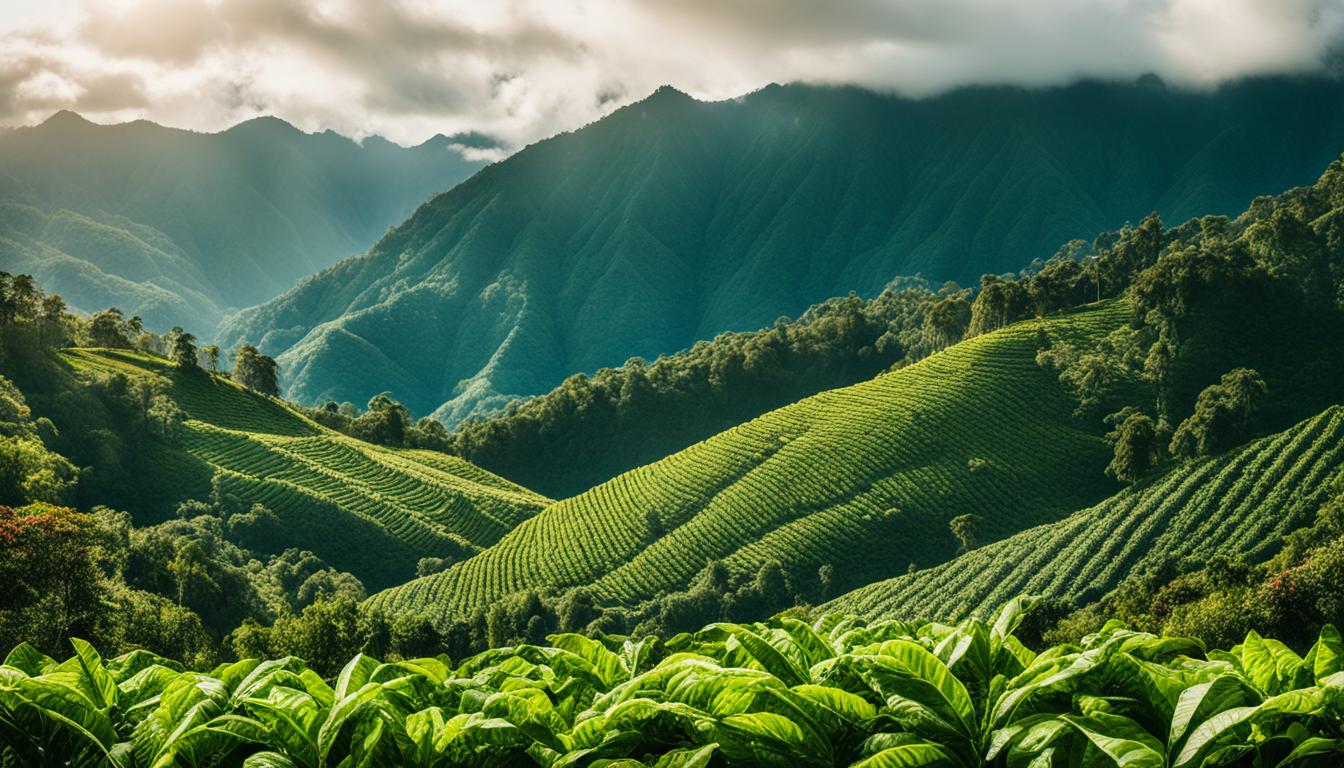Greetings, fellow coffee aficionados! Today, we’re diving into the world of organic coffee and exploring its numerous benefits. Not only does organic coffee offer a delightful and flavorful way to start your day, but it also comes with a host of advantages that go beyond just satisfying your caffeine cravings.
When we talk about organic coffee, we’re referring to a brew that is grown and processed without the use of synthetic fertilizers, pesticides, or herbicides. It’s a coffee that adheres to strict certification standards to ensure that it is free from toxic molds and contaminants.
Key Takeaways:
- Organic coffee is grown and processed without the use of synthetic fertilizers, pesticides, or herbicides.
- Strict certification standards ensure that organic coffee is free from toxic molds and contaminants.
- Choosing organic coffee supports sustainable farming practices.
- Organic coffee helps reduce carbon emissions and support farming communities.
- Look for certified seals and product details to recognize organic coffee.
The Environmental Wonders of Organic Coffee
Organic coffee is not only beneficial for our health but also for the environment. By choosing organic coffee, you are supporting sustainable coffee farming practices that prioritize the welfare of the ecosystem. Unlike conventional coffee farming, which relies on synthetic fertilizers, pesticides, and herbicides, organic coffee is cultivated using environmentally-friendly techniques.
One of the key practices in organic coffee farming is intercropping. This involves planting coffee trees alongside other crops, such as fruits or vegetables. Intercropping promotes biodiversity and creates a balanced ecosystem where different plants complement and support each other. The diverse vegetation also attracts beneficial insects, creating a natural pest control system for the coffee farm.
In addition to intercropping, organic coffee farmers also prioritize composting. They utilize organic waste, such as coffee pulp and other agricultural by-products, to produce nutrient-rich compost. This helps improve soil fertility, enhances water retention, and reduces the need for synthetic fertilizers. By enriching the soil naturally, organic coffee farming fosters a healthier and more sustainable environment for both the coffee plants and surrounding wildlife.
Another significant aspect of organic coffee farming is shade-grown cultivation. Instead of clearing large areas of land, organic coffee farmers allow the coffee plants to thrive under the shade of taller trees. This provides a natural canopy that protects the coffee plants from harsh sunlight and helps maintain a stable microclimate. Shade-grown coffee preserves the habitat for various bird species and other wildlife, contributing to the conservation of delicate ecosystems.
To illustrate the environmental wonders of organic coffee, take a look at the following table, showcasing the key sustainable farming practices used in organic coffee production:
| Sustainable Farming Practices | Benefits |
|---|---|
| Intercropping | Promotes biodiversity and natural pest control |
| Composting | Improves soil fertility and reduces dependency on synthetic fertilizers |
| Shade-Grown Cultivation | Preserves habitat for wildlife and maintains ecological balance |
By supporting organic coffee farming, we contribute to the preservation of delicate ecosystems and the well-being of local communities. Sustainable practices ensure a healthier and more sustainable coffee industry, both for us and the planet.
The Mold-Free Marvel: Revealing Organic Coffee’s Secrets
Organic coffee is not only known for its numerous health and environmental benefits but also for its remarkable ability to remain mold-free. This can be attributed to the stringent quality control measures implemented throughout the production process. Let’s delve into the secrets behind organic coffee’s mold-free marvel.
First and foremost, the method of picking and processing coffee cherries plays a crucial role in preventing mold formation. Organic coffee farms employ careful harvesting techniques, ensuring that only ripe cherries are picked. This meticulous selection process helps reduce the risk of mold contamination from the beginning.
To further safeguard against mold growth, organic coffee production relies on natural pest control methods. Synthetic pesticides, apart from being harmful to the environment, can also promote mold development. Therefore, organic farmers utilize natural alternatives such as companion planting and biological controls to keep pests at bay. By minimizing the use of synthetic pesticides, the risk of mold growth is significantly reduced.
The proper processing and storage of organic coffee also contribute to its mold-free nature. After the cherries are harvested, they undergo meticulous processing to separate the beans from the pulp. This process is carried out using equipment and practices that prioritize hygiene and prevent mold contamination.
Once the beans are extracted, they are carefully dried and stored under controlled conditions. The moisture content is closely monitored to ensure the beans do not become a breeding ground for mold. With these measures in place, the chances of mold contamination are minimized, resulting in a clean and mold-free end product.
It’s important to note that organic coffee’s resistance to mold can also be attributed to the health of the soil in which it is grown. Organic farms prioritize soil health by using organic matter-rich compost and practicing crop rotation. These practices enhance soil fertility, promote beneficial microbial activity, and provide an environment that discourages the growth of mold and other diseases like mildew.
By adhering to strict organic standards and implementing rigorous quality control measures, organic coffee ensures that every cup you enjoy is free from molds and contaminants. The attention to detail throughout the production process, from cherry to cup, guarantees a high-quality and mold-free coffee experience.

The Benefits of Mold-Free Organic Coffee
- Enhanced flavor and aroma: Mold-free organic coffee allows the true flavors and aromas of the beans to shine through, providing a more enjoyable and authentic coffee experience.
- Reduced health risks: By avoiding mold contamination, organic coffee safeguards against potential health risks associated with consuming moldy substances.
- Extended shelf life: The absence of mold helps prolong the shelf life of organic coffee, ensuring its freshness and quality are preserved for longer periods.
- Easier digestion: Mold-free organic coffee is gentler on the digestive system, making it an ideal choice for those with sensitive stomachs or digestive issues.
- Peace of mind: Knowing that your coffee is mold-free and produced using environmentally friendly practices gives you peace of mind, allowing you to fully savor every sip.
The Marvel of Quality Control: Ensuring Mold-Free Organic Coffee
Quality control plays a vital role in maintaining the integrity and mold-free nature of organic coffee. From farm to packaging, every step is carefully monitored to uphold the highest standards. Regular inspections, certifications, and adherence to organic regulations provide consumers with confidence in the quality and safety of organic coffee.
By choosing organic coffee, not only are you indulging in a superb tasting cup, but you are also supporting sustainable agricultural practices, protecting your health, and nurturing the environment.
How to Recognize Organic Coffee
Recognizing organic coffee is easy when you know what to look for. By understanding the certified organic standards and the organic certification process, you can confidently make informed choices when purchasing your favorite coffee brands.
One reliable way to identify organic coffee is by looking for the certified organic seal on the packaging. This seal indicates that the coffee has undergone a rigorous certification process and meets the standards set by reputable organizations. So, when you see that seal on your coffee, you can trust that it is genuinely organic.
Many organic coffee brands go the extra mile to highlight their organic credentials in their product descriptions and labeling. They want you to know that their coffee is sourced from sustainable and eco-friendly farming practices. So, keep an eye out for organic coffee brands that proudly display their organic certifications.
Researching the producer or brand can also provide valuable insights into their organic practices and certifications. Take the time to explore the company’s website, social media platforms, and customer reviews. Look for information about their commitment to organic farming, sustainability, and environmental stewardship. By doing your homework, you can ensure that the coffee you choose aligns with your values.
Trusting independent third-party organizations that verify organic claims is another reliable way to identify certified organic coffee. These organizations serve as watchdogs, ensuring that coffee brands adhere to the highest organic standards. Look for certifications from well-known organizations such as the Organic Trade Association (OTA), Rainforest Alliance, or Fair Trade Certified.
Now that you know how to recognize organic coffee, you can confidently enjoy your cup of coffee, knowing that you are supporting sustainable farming practices, protecting the environment, and savoring the many benefits of organic coffee.
| Benefits of Recognizing Organic Coffee | Why It Matters |
|---|---|
| High-Quality Coffee | Organic coffee undergoes rigorous standards and certifications, ensuring that you enjoy a premium and flavorful cup of coffee. |
| Environmental Sustainability | By choosing organic coffee, you support farmers who use sustainable farming practices that protect the environment, wildlife, and biodiversity. |
| Health Benefits | Organic coffee is free from synthetic chemicals, pesticides, and herbicides, offering you a healthier brew without compromising flavor or enjoyment. |
| Supporting Fair Trade | Many organic coffee brands are also fair trade certified, ensuring that farmers receive fair wages and opportunities for economic growth. |
| Carbon Footprint Reduction | Organic coffee farming practices help reduce carbon emissions and minimize environmental impact, contributing to a greener and more sustainable world. |
Conclusion
Organic coffee offers numerous benefits for both individuals and the environment. With its mold-free nature and the use of sustainable farming practices, organic coffee ensures a healthier and safer cup of coffee. By supporting organic coffee, you are not only enjoying its many health benefits but also promoting an environmentally friendly and sustainable coffee industry.
The organic coffee certification process guarantees that the coffee you choose meets strict standards set by reputable organizations. Recognizing organic coffee can be as simple as looking for the certified organic seal on the packaging or researching the producer or brand. This allows you to make informed decisions and support those who prioritize sustainable farming practices.
By opting for organic coffee, you contribute to supporting sustainable farming communities and reducing carbon emissions. Organic coffee is grown using methods that preserve biodiversity, conserve water sources, and prevent soil erosion. This means that your cup of coffee has a positive impact on the delicate ecosystems where it is cultivated.
Experience the rich flavors and benefits of organic coffee while knowing that your choice aligns with your values and helps create a more sustainable future. Choose organic coffee for a healthier you and a greener planet.
FAQ
What are the benefits of organic coffee?
Organic coffee offers many benefits, including being mold-free and grown with environmentally-friendly practices. It supports sustainable farming communities and helps reduce carbon emissions.
How is organic coffee grown?
Organic coffee is grown using sustainable farming practices that prioritize the environment’s welfare. It avoids the use of synthetic fertilizers, pesticides, and herbicides and relies on techniques like intercropping, composting, and shade-grown crops.
How is organic coffee kept mold-free?
Organic coffee remains mold-free due to strict quality control measures. The coffee cherries are picked and processed in a way that prevents mold formation. Natural pest control methods are used to reduce the use of synthetic pesticides, which can promote mold growth.
How can I recognize organic coffee?
Organic coffee can be recognized by looking for the certified organic seal on the packaging. Additionally, organic coffee brands often highlight their organic credentials in product descriptions and labeling. Researching the producer or brand and relying on independent third-party organizations that verify organic claims are also reliable ways to identify certified organic coffee.




